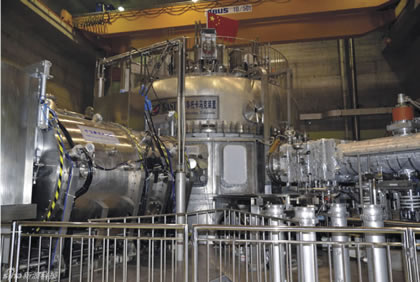Schiller Institute Conference:
Donald Trump and the New International Paradigm
Monday, December 12th, 2016
Copenhagen, Denmark
Special Guest Speakers:
Helga Zepp-LaRouche - Schiller Institute founder and chairwoman
A [PDF version of this transcript]appears in the December 16, 2016 issue of Executive Intelligence Review and is re-published here with permission.
This is an edited transcript of a Dec. 12 address by Mrs. Zepp-LaRouche to a Schiller Institute/EIR seminar in Copenhagen. She was introduced by the Chairman of the Schiller Institute in Denmark, Tom Gillesberg. The audio of Mrs. Zepp-LaRouche’s statement is available at https://youtu.be/XWA6PYhu4SM .
Tom Gillesberg: Introducing Helga is very difficult, because she’s simply been involved in so many things over the last half-century that it’s almost difficult to describe: One can say that she began her career of the activities she’s in right now in 1971, when as a fresh, young journalist, she came to China, and had a chance to see what was then definitely not a developed country. And after she came back home—after going around the world— she joined the LaRouche movement, and then married Lyndon LaRouche and became an international leader in the question of how to create a new paradigm for the world, which would give the whole world a chance for real economic development for a new, just world economic order.
In that process, in 1984 she founded the Schiller Institute. Later, with the fall of the Berlin Wall, she became very active in arranging conferences both in Western and Eastern Europe, and in the United States on using the great potential of that time. Later, when that did not really materialize, she became a driving force in the establishment of the Eurasian Land-Bridge, and what she described in many conferences in Europe, in China, and other places, as the “New Silk Road” policy for development of the whole world. And as you all know, this is now the policy that the Chinese government is carrying out. And for that reason, I think she is the right person to have here today to discuss all of this in light of the incoming new Presidency in the United States. So, please welcome Helga Zepp-LaRouche. [applause]
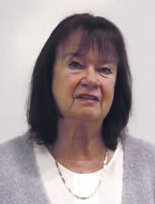
Schiller Institute
Helga Zepp-LaRouche addresses the Schiller Institute/EIR seminar in Copenhagen. |
Helga Zepp-LaRouche: Good morning ladies and gentlemen. As Tom already noted, we are living in very, very interesting times. This is actually, I think, a Chinese wish, that people say “I wish that you should live in interesting times,” and I think we do. Because we are right now in a completely changing strategic situation, which is characterized by completely different vectors of development, and, therefore, it’s almost impossible to predict which of these vectors will be the victorious ones. I have an inclination about which one that is going to be, but nothing is in safe areas, nothing is in an area where you could lie back and say “OK this thing is fine,” because it’s not.
Because you have, I would say, three fundamentally different dynamics. The first one, which concerns us here in Europe, which is the fact that there is, right now, a global revolution against the system of globalization underway. And that is not finished, and it will not stop until the causes for this global revolution are remedied. I think the first massive manifestation was the Brexit last June in Great Britain, where the majority of the people voted to leave the European Union.
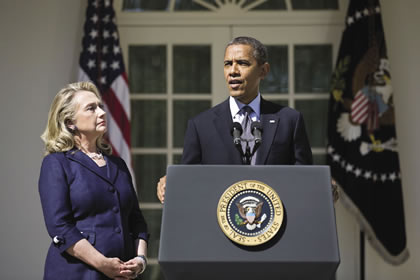
White House Photo by Lawrence Jackson
President Barack Obama, with Secretary of State Hillary Rodham Clinton, Sept. 12, 2012, delivers a statement regarding the attack on the U.S. consulate in Benghazi, Libya. |
The second major manifestation of this was the rejection of Hillary Clinton, and with that, also a rejection of the policies of the 16-year U.S. Presidencies of Bush and Cheney and Obama, because Obama was really the total continuation of the previous policies of Bush and Cheney. He was not the Messiah who many people believed he would be. But we never thought that. As a matter of fact, I remember that when Obama was speaking in front of 200,000 people in Berlin, I wrote an editorial, “Obama, the Soufflé”—a lot of outside, but not much substance. And I also said at that point, which was not very popular, I said “the Germans apparently always need a leader to follow. Sometimes he is called Adolf, sometimes he is called the Dalai Lama, sometimes he is called Gorby, now he is called Barack.” And that was not popular, but we had looked at Obama more closely, and I think we turned out to be right, if you look at the continuation of the wars in the Middle East and the killing policy of the drones, and similar things.
Now, I also want to remind people that my husband, Lyndon LaRouche, made a very famous international webcast on July 25, 2007, which was one week before the secondary mortgage crisis in the United States erupted, where he said, “Globalization is finished. This is the beginning of a global crisis which will not stop.” And, again, many people were in disbelief. And one week later, you had the mortgage crisis in the U.S. breaking out; you had the collapse of this major bridge, which he also had predicted. He said that there will be a collapse of infrastructure, and one week later, the bridge, I think it was in Minnesota, broke down.
A Pregnant Moment
This collapse of globalization, I will talk about in a little while, but it is basically the unifying element between the Brexit, the Trump vote, and now the “No” to the referendum in Italy. Naturally, if you have a system of government where too many people are left behind, where the gap between rich and poor becomes unbearably wide, then eventually such revolts occur. So this is one dynamic, which is obviously affecting the trans-Atlantic sector.
But then you have a more happy dynamic, which is the New Silk Road/Belt and Road initiative initiated by China three years ago, which is already, now, twelve times larger than the Marshall Plan which led to the reconstruction of the postwar Germany and other countries; and it already involves 100 countries and large international institutions. It involves already the majority of mankind, 4.4 billion people, and it is growing very, very rapidly. It has the potential to eventually be the victorious one, because it is based on the idea of “win-win cooperation,” where every country can participate, to its own benefit and the benefit of all others.
And then, the newest, third vector of development, which is completely undetermined yet as to where it will go—but nevertheless it is a completely new thing—is the election of Donald Trump to be the next President of the United States.
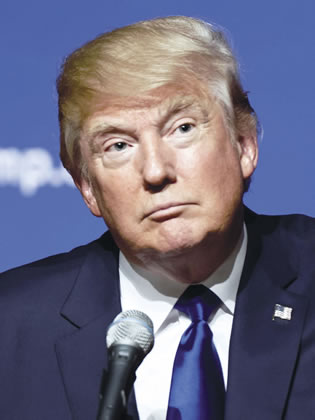
U.S. President-elect Donald Trump |
Up to the present day, the neocon-dominated media in the trans-Atlantic sector are really not grappling with the situation that there is a new U.S. President. They’re still in a pre-election mode of unbelievable slanders and spins; as a matter of fact, when the election campaign was underway, I talked with an American who was in the United States, watching Trump’s speeches and the reaction of the population. And then he came to Europe and he said, “the media here are portraying this in such a wrong way!” I’m not defending the manners of Mr. Trump; do not misunderstand me. The famous German Baron von Knigge, who developed the code of behavior of civilized people, would probably turn in his grave about some of the things Trump does. But, you know, there is a difference between substance and admittedly questionable behavior.
Now, what Trump did, which I think is the most important—the moment he got elected he got on the phone and he talked to Russsian President Putin and Chinese President Xi Jinping, and all sides afterwards confirmed that the intention was to normalize and improve the relationship between the United States and Russia, and the United States and China. And I think this, for any person who is in their right mind, is the most important: Because if Hillary Clinton had been elected, we would be on a short road to a global confrontation, because her plans to establish a no-fly zone over Syria implied the immediate possibility of this conflict going completely out of control and leading to a global confrontation.
So naturally, this is not yet completely remedied. Because it is now Dec. 12th, and it is still five or six weeks until Trump gets into the White House, and you can see very clearly that Obama is trying to create as much chaos on the way out of the White House as he possibly can. He just made a decree where he basically ordered the arming of the rebels in Syria, including providing them with so-called MANPADs, that is shoulder-fired missiles which can shoot down planes; which could really also shoot down American planes, or other planes, so it’s a very incredible thing. And I think it’s very important that Trump is completely opposed to this. And so is Rep. Tulsi Gabbard, who is a very young, talented congresswoman from Hawaii, who introduced a bill in reaction to this—she’s from the Democratic Party—but she introduced a bill prohibiting arms sales to such rebel groups and is leading a bipartisan effort to this effect.
There is also the effort by the neocons to ruin the relationship with Russia and China in the remaining period as much as possible. For example, the neocon Heritage Foundation in the United States sent a delegation in October to Taiwan. This was Ed Feulner and Stephen Yates, who used to be the national security aide to Dick Cheney, and Reince Priebus, the new member of the Trump team. They went to Taiwan; and this was coordinated with the effort by the Taiwanese government to use the incoming new Presidency to change the “One China” policy. So they had hired three lobbyists: Bob Dole, Richard Gephardt, and Tom Daschle, to get access to the President-elect and get a policy change. And it was that combination of Heritage plus lobbyists, who arranged the phone call of Taiwanese President Tsai with Trump, congratulating Trump for his election. And Trump took the phone call, and this was then made a big affair by the international media, because this violated the One China policy.
Our Active Role
The Chinese government took a very laid-back attitude; they said this was the fault of President Tsai and they didn’t blame Trump so much. But obviously, such maneuvers are taking place, but they’re probably offset by the fact that Trump appointed the next U.S. Ambassador to China to be Terry Branstad, who is the Governor of Iowa and a personal friend of President Xi Jinping since 1985, when Xi Jinping came to Iowa for the first time to do some agricultural training, deals and so forth. Branstad would in all likelihood be completely opposed to having a trade war with China, or sanctions, and will insist on good relations.
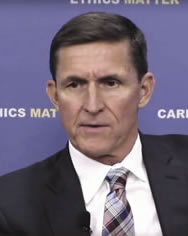
Carnegie Council/
youtube screenshot
Lt. Gen. Michael T. Flynn |
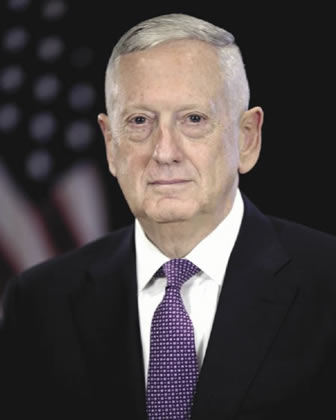
Office of the President-elect
James Mattis |
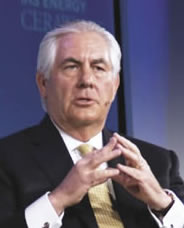
ExxonMobil
Rex Tillerson |
If you look at the other appointments which are known so far in the new Trump team, they’re all interesting people, because most of them are explicitly anti-neocon. They’re very conservative, but that’s not the same thing as neocon, in the same way that the Nazis were not conservatives. There is a difference between such things.
For example, Gen. Michael Flynn, who is now the new National Security Advisor of Trump, was kicked out of the position of Director of the Defense Intelligence Agency in 2014, because he had criticized Obama for arming the different terrorist groups: al-Qaeda, al Nusra—ISIS did not yet exist at that point; but he said that these groups intended to build an Islamic caliphate, and it was the intention of Obama to have them do that, in order to topple the legitimate, elected governments. Which was the truth, and he was kicked out for that reason; so he’s now the National Security Advisor of Trump.
Then there is Gen. James Mattis, the retired CENTCOM commander, a four-star general who is known to be completely against the wars for regime-change purposes, as is Flynn and Gen. John Kelly (ret.)—and all of them share the idea that the United States should stop intervening in the affairs of other countries, toppling regimes, and making color revolutions and similar things.
Trump about two weeks ago made a speech in Cincinnati, where he laid out his foreign policy approach. He said we should absolutely not have these foreign wars. We should stop having wars against regimes about which we know nothing, which only leads to chaos, and we should instead build friendship with old friends, and make new friendships.
Another appointment causing a big freakout on the neocon side is that of Rex Tillerson, the head of ExxonMobil, who is supposed to become the new Secretary of State. And he had been given the most important Russian friendship award by President Putin.
It may be there are some other interesting appointments; there are also some problematic appointments, like three or four members of Goldman Sachs who are in the economic team. We have to see how that plays out, because in the worst case it’s a continuation of Wall Street policies. In the best case, it’s like Franklin D. Roosevelt’s appointment of Joe Kennedy, who was a member of the banking lobby, but he got him to implement Glass-Steagall, because, as he said, “it takes one to know one,” so you need someone who knows the business. But I don’t want to make a prediction on that, because Goldman Sachs is also the origin of European Central Bank (ECB) President Mario Draghi and such people.
Obama is now throwing another hand grenade into the situation, by ordering Director of National Intelligence James Clapper to “investigate” Russia’s supposed theft of the U.S. election through cyber attacks against Hillary, the Democratic National Committee, and so forth. This is a big thing; all the papers are saying Russia intervened in the U.S. election. All the German papers are now repeating the same thing, and they’re saying, “Oh, we have to be so concerned that Russia will meddle in the upcoming Federal election in Germany next year.” But Trump already denounced that, and said this is a big lie—it is the same kind of lie as the “weapons of mass destruction” lie against Iraq. And there was also a hearing in Congress, where the FBI testified that there is absolutely no evidence for Russian involvement in these attacks. Trump said these attacks could have come from anyplace, from New Jersey, or anywhere else.
And also, as the President of South Korea is being impeached, the South Korean Defense Minister announced that the deployment of the THAAD missiles, which are regarded by Russia and China as a strategic threat, is being sped up, which is not a good development at all.
What is the perspective for what we want to do?—because we’re not just looking at Trump, analyzing in a contemplative way; but we have a very active approach. We want the United States to join the New Silk Road dynamic. Because if you have recently been in the United States, the United States is in urgent need of infrastructure. If you drive on the highway from Washington to New York, there are potholes which are really so big that you can’t drive a small car, because you can just vanish into them. And don’t try to go on a fast-train system in the United States, because there is none. Only tiny Amtrak, but it can be as slow as anything.
The Crisis of the System
So we want the United States to have an infrastructure program, which Trump already announced. He said he wants to build an infrastructure program with a $1 trillion investment in the next years and make the infrastructure in the United States the most modern in the world. Now, that’s quite a mouthful, because then he has to compete with the Chinese infrastructure program which is unbelievably modern and fast-growing—up to 2014 China has built 20,000 km of fast train systems, and the Chinese fast trains are excellent; they’re fast, they’re smooth, they’re quiet. And by the year 2020 China will have built 50,000 km of fast train systems, connecting every large city in China with such a system. So Trump has quite a lot to do.
But obviously, if this infrastructure program in the United States were connected to the New Silk Road efforts via the Bering Strait and to Latin America, you could have a completely different paradigm in a very short period of time. And one can almost be certain that the new U.S. Ambassador Branstad will advise that the United States join the AIIB, the Asian Infrastructure Investment Bank.
This is very urgent, because the United States is in a terrible crisis. The crisis in the United States is much worse than people in Europe normally know. The National Center for Health Statistics just put out new figures about an increase in the death rate of people in the United States: For example, from 2014-2015, the death rate in the United States went up. That is really unbelievable, because normally in the industrialized world, the death rate would continuously fall! Longevity would increase. But here, from the 10 major diseases, the death rate increased; the average life expectancy for men decreased from 76.5 to 76.3, that is 0.2 year of shrinkage; and for women from 81.3 to 81.2, by 0.1 year. Since life expectancy is the best indicator for the wellbeing of people, this is really unbelievable. And in the 16 years of the Obama and Bush administrations, the suicide rate quadrupled in all age groups, for reasons of drug addiction, alcoholism, depression, especially white women—white women in rural areas.
Obviously, this is the result of globalization, because the Wall Street people became richer and richer, but the so-called rust belt in the United States became poorer—those states which were previously industrialized, which Hillary Clinton was too arrogant to even visit in the election campaign, because she thought she had these states in her pocket—but these were the states that voted against her.
But in Europe the situation is not any better, at least in parts of Europe. As a result of the Troika policy, you have now impoverishment of 45% of the Greek population; 45% of people in Greece are living below the poverty line. That is no good!
In Italy, you have now an unemployment rate, estimated even by the EU Commission, of 23% average, but 50% of the youth—every other youth has no job and no chance to get higher education, which means they have no future. And this is even 65% in Calabria, Sardinia, and Sicily, despite the fact that every year, 100,000 people leave the Mezzogiorno because they have no choice, so there is a tremendous brain drain. And one person in four in Italy is regarded as poor, and the health system has completely collapsed, as it has in Greece.
This is why the people voted “No” to the referendum of Renzi, just a week ago, because what this referendum was supposed to do is to streamline the Italian Constitution according to the guidelines of the European Union, and in that way fulfill the requirements of JP Morgan which had already put out a study some years ago, saying some of these European constitutions should be changed. They were written in the postwar period, and they provide too many protections for labor, and should be rewritten. And that was what Renzi was trying to do, by taking the EU guidelines and changing the Italian Constitution according to these provisions—but the Italian people rejected it, 60-40%, and now Renzi is out. This is a situation which is reflective of the deep-rooted rejection by the population of these policies.
What was the reaction of the European Central Bank to the “No” to the referendum and to the Italian banking crisis, which threatened to fully erupt, because if these requirements of the EU could not be fulfilled, then the conflict between the national interests of Italy and the EU would break out even more. What did the ECB do? ECB President Mario Draghi announced that he would continue quantitative easing forever. He said, at least until the end of 2017, I will reduce the quantitative easing from €80 to €60 billion per month—that’s still a lot of money—but I may increase it even higher than €80 billion if required, and it could even continue beyond 2017. Which means that the total amount of ECB state bond buying is now €2.3 trillion, which is quite amazing.
Now, what that amounts to is that you start to finance the deficit of states with the printing press, and that is exactly what the Reichsbank in Germany did in 1923. And people should not be fooled by the so-called “low inflation” rate, because the Reichsbank financed the war debt and the reparations of Germany for four years before it became visible. But then in spring 1923, it erupted very, very quickly.
Now, this measure by the ECB is so outrageous that even the neoliberal house organ of Frankfurt, Germany’s financial capital, the Frankfurter Allgemeine Zeitung, had an amazing editorial a week ago, where they said the ECB broke all rules of Maastricht and all the EU treaties; they have now become a debt union, a union of people where everyone has to take care of everyone else’s losses; whereas the rules said that this should never happen. It is a violation of the non-assistance clause; and it basically makes the savers poorer, and the speculators richer. And then the editorial says: If the politicians denounce this reaction of the people against this policy as “populism,” they are in a complete state of denial.
And that is absolutely true, because there is such a thing as natural law. If you violate the living conditions of people for a very long period of time, they may take it for a while, because people are—you know, sometimes they trust the government, and they think things will not be so bad. But if it removes the basis for existence of ever large numbers of people, then eventually you see exactly what you’re seeing right now.
Now, what you have is a complete state of denial of reality, on the side of those people who say “this is just populism, demagogues who hype up the people,” and it is interesting that the neoliberal/neocon press, both in the English-speaking world and in Germany, chose the same word as the “word for the year.” In English it’s “post-truth,” and in German it’s postfaktisch, which is the same thing—which is the idea that people no longer react to the facts, but they only react to feelings—and that the facts are that everybody is better off, but people have a feeling that the are worse off, and therefore they only listen to their feelings, and therefore. . . . You know, it’s really a manipulation. So whenever you read this word “post-truth” or postfaktisch, I’m sure its one of these creations of psychological think-tanks to manipulate the people. Because I would say that what is at work is not postfaktisch or post-truth; what is at work is natural law. That there is a justice in the universe and in the political order, which you cannot violate for a very long period of time. You cannot make the rich, the upper 0.1% and upper 1% of people—you know, 80 people now own as much wealth as 3.5 billion people! Now, does that make sense? No! It doesn’t make sense, and you cannot have a world where this goes on.
So the rules of the European Union, ECB, all have been broken completely, and there is a legal principle which is called “Pacta sunt servanda”: “Treaties must be observed.” If you don’t have that legal principle, there is no order in the world any more; if you can make a pact, a treaty, and then everybody turns around and violates it, you have chaos. And it is really the EU itself dismantling the EU; it’s not the people, it’s this unjust system which is doing that.
So it is no surprise that this rebellion against the system is taking place, and if you take this word “globalization,” another word for the same thing is “Anglo-American empire.” Now, Anglo-American empire is really the power of Wall Street and the City of London, and they said up to recently, “we are in a unipolar world; we set the rules.” This was the purpose of TTIP for Europe, the trans-Atlantic trade relations; and of TPP for the trans-Pacific trade relations. And Obama had an article in the Washington Post several months ago, where he said: The purpose of TPP is that it is the United States that sets the rules in Asia, not China. And he said it as explicitly as that.
But the world is no longer a unipolar world; that’s an illusion. And one has to really look at the EU from that standpoint, that since the Maastricht Treaty,. . . and I just want to remind people that with the unification of Germany, people said, “they have to pay a price, they have to give up the dmark for the euro.” It was especially Thatcher, Mitterrand and Bush, who insisted that the price for German reunification would be the euro. And it was an attempt to make the European Union the proconsul of this Anglo-American empire, the regional stake-holder, so to speak, of this power of Wall Street and the City of London.
People have wondered, maybe, why did nobody do anything to correct the casino economy after the crash, the systemic crisis of 2008? One could have thought this was almost a systemic crisis. People were completely freaked out that this could lead to a meltdown, with terrible chaos. But then, they decided to do the same thing, over and over: rather they made it worse. What did they do? They implemented quantitative easing, money printing, negative interest rates, you now have money in most countries, you bring it to the bank and you have to pay. No more interest, but you have to pay! And then, they even talk about “helicopter money,” that was the old idea of Ben Bernanke. He said, before we would allow a banking crisis to take down the system, we would fly helicopters over the cities and just throw money out, to create as much liquidity as required. And now, the last phase of it is what the ECB is doing to with state financing by the printing press.
That cannot go on. But this is the reason that I’m saying that this revolt will go on until the causes of the injustice are remedied, and we will again have governments which take care of the common good of the people. Now, it is almost the case, that people in Europe, when you say the purpose of government is to be for the common good of the people, they look at you and say, “What?! I never heard such a thing.” Because politicians are there because they want to have a position, privileges, they want to be reelected . . . but to be for the common good of the people? This is almost an exotic idea. [laughter]
So unfortunately, this unipolar world attempt also had a military-security component, and that was the cause for the eastward expansion of the EU and NATO. That is why NATO is continuously moving toward the borders of Russia; the EU in the same way: This is the whole reason for the Ukraine crisis, because the EU wanted to incorporate Ukraine into the EU, which would have had a military component, and that was why all of this Ukraine crisis happened, and not Putin annexing Crimea, which is the official story.
View full size 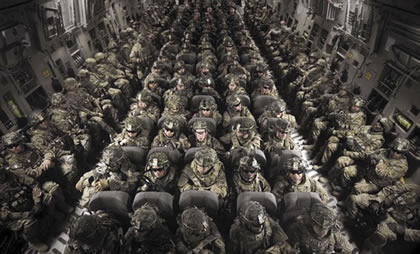
Paratroopers on NATO maneuvers in Estonia are part of the largest military mobilization on Russia’s western border since World War II. |
But we saw the encirclement of Russia and China, the building of a global anti-ballistic missile system which was read correctly by the Russian and the Chinese military as an attempt to prepare a first-strike capability with the ability to take out the second strike capability of these countries; where naturally, both Russia and China said we cannot allow that, and we will have to take adequate countermeasures. And that was the road which we were on with Obama. This is why many military experts said that we are in a crisis more dangerous than at the height of the Cold War; and if you remember, the height of the Cold War was the Cuban Missile Crisis, which brought us to the brink of extinction. And if people say this was more dangerous, and it really is more dangerous, then people should take this seriously!
And with this “unipolar world” came the idea of regime change against every country that would not submit: This was the reason for the war against Afghanistan, Iraq, Libya, Syria, Ukraine, and the color revolutions; and so if you look now at the result of this, it’s a string of one policy failure after another. For example, Chas Freeman, who is a former U.S. ambassador to Saudi Arabia, and other countries, made a very interesting speech about a year ago in Washington, where he said: even if you look at this policy of foreign intervention and wars from a narrow American standpoint, they have not served U.S. interests. U.S. interests and the U.S. reputation in the world have deteriorated; the whole creation of this terrorism is the result of it; the world has become much more insecure as a consequence.
The New Paradigm
Now the really good news is to come to the dynamic I was describing: And that is that the new paradigm of a completely new set of international relations is already fully underway. As I said, it involves the greater part of mankind. When President Xi Jinping announced the New Silk Road/“One Belt, One Road” policy initiative in September 2013 in Kazakhstan, we of the Schiller Institute were naturally extremely happy, because those of you who have known us for a longer period of time—and Tom referenced it already—you know that this is what we have been working for, for the last quarter of a century. Because when the Wall came down in Berlin, we were prepared for that, because Mr. LaRouche had already predicted in 1984, that the Soviet Union and the Comecon would collapse if they stuck to their then-existing military policy.
So, in 1988, Mr. LaRouche and I gave a press conference in Berlin, where he said, Germany will be soon unified, and we would develop the East, or the Comecon countries, with modern technologies, starting with Poland. And then, when the Wall came down, within a week, I wrote a leaflet. I said, “Continue, Beloved Germany,” and then I said what Germany should do, because we knew this would happen. And then we proposed the integration of Eastern and Western Europe through infrastructure corridors; and when the Soviet Union collapsed in ’91, we said, okay, we will extend this European program to become a Eurasian program. Let’s connect the population and industrial centers of Europe with those of Asia through development corridors, and we called it the Eurasian Land-Bridge, the New Silk Road.
And we held hundreds of conferences and seminars all over the world for this perspective, and in 1996, China organized a big conference in Beijing, which they called, on our suggestion, “The Regions along the Eurasian Land-Bridge and Their Development.” And at that point China already wanted to have the Eurasian Land-Bridge as the long-term strategic perspective of China.
Then the Asia crisis came in ’97 and the whole effort was interrupted. But in 2013, President Xi Jinping put the New Silk Road on the agenda, and ever since, this is developing to be the largest infrastructure and development program ever in history.
It is an unbelievable dynamic, and just because you don’t read about it much in the media, it doesn’t mean it’s not happening. It is very much happening, and the basis of it is that China is exporting the Chinese economic model to all other participating countries. And the Chinese economic model, for anybody who has been in China, is unbelievable. The German economic miracle was also very remarkable, but the Chinese economic miracle is probably even more remarkable, because it’s a much larger country involving 1.4 billion people. They just recently published a white paper showing that China has lifted 700 million out of extreme poverty; and by the year 2020, they want to lift the remaining 5.7% of poor people out of this condition, and have no more poverty in China.
View full size 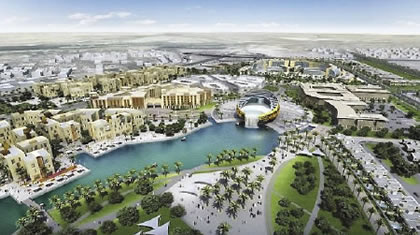
Yachay, Ecuador’s City of Knowledge, under development with Chinese funding, is intended to serve as a regional hub for a variety of scientific, technological, and trade activities. China views it as a key component of the One Belt, One Road perspective. |
So, China, by following the reforms of Deng Xiaoping, and completely reversing the course of the Cultural Revolution, has repeated in 30 years an economic development that the industrialized countries took 200 years or 150 years to achieve. And if you have been in Shanghai or Beijing or Chongqing or Chengdu, or any other large city in China, it is really amazing what a level of development China has accomplished. And now they’re exporting that by making the New Silk Road the common motor for development: They’re building fast train systems, infrastructure corridors, and energy production and distribution.
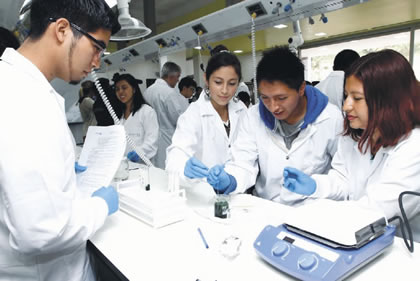
Carlos Silva/Vicepresidencia
Students working in the lab at Yachay Technical University. |
They’re building science cities with developing countries. Xi Jinping was just in Ecuador, where they’re building a science city. President Correa of Ecuador said that China and Ecuador are united in their wish to be at the frontier of science and have the most advanced technologies. Ecuador is still a poor, developing country, but they’re now inspired by China to leapfrog,—you know, to not just repeat what the industrial countries were doing over 200 years, but to leapfrog to the top. And China is helping them.
And this has completely changed the dynamic in the whole world. So, this now involves more and more regions of the world. The original route goes from China through Central Asia to Europe; but now it is already spreading to the ASEAN countries, and to the 16 + 1 Central and East European Countries (CEEC), who are all happy when China comes and invests in infrastructure in a railway between Serbia and Hungary and Poland. Even Poland—Nursultan Nazarbayev, the President of Kazakhstan, was recently at a conference in Poland, where he said that they are now building a development corridor from Kazakhstan to Poland, through Russia, and that he personally wants to help to overcome the tensions between Poland and Russia.
The Peace Order of the 21st Century
So what we are looking at is not just economic development, but this is the basis of a peace order for the 21st century: Because if you have common development for everybody, then you also tend to eliminate the causes for war. It also involves more and more Latin American countries. In the recent trip of Xi Jinping to Latin America, he visited Ecuador, Peru, and Chile; and China is now building a transcontinental railway from Brazil to Peru, several tunnels between Chile and Argentina, a new canal in Nicaragua, and other such things.
Now the process of economic integration is going extremely rapidly. At the Vladivostok Economic Forum in the beginning of September, there was not only the integration of the Eurasian Economic Union with the “One Belt, One Road” policy, but also Japanese Prime Minister Shinzo Abe was there. And Japan is now massively investing in the Far East of Russia. Then, this integration was continued at the G20 summit in Hangzhou, where China said the new economic philosophy will be innovation. Only through innovation will we get out of the economic crisis. And it was continued at the ASEAN summit and the East Asia summit in Laos; at the BRICS conference in Goa, India, in October; and at the recent APEC summit in Lima, Peru in November.
Now, China and the other Asian countries, and the BRICS countries have also constructed a lot of new banks: The AIIB, the Asian Infrastructure Investment Bank; the New Development Bank; the Silk Road Fund, the Maritime Silk Road Fund, and other banks like the Shanghai Cooperation Organization bank, and the South Bank of the South Asian countries. And all of these banks are built on a completely different principle than the IMF and the World Bank, because these new banks are only there for infrastructure and other investment in the real economy, not for speculation. And this is very, very important, because it is almost like the lifeboat for the sinking Titanic of the collapsing trans-Atlantic financial system, because it is a model of what banking should be. You don’t need speculation; you don’t need derivatives; you don’t need all of this; but what these banks deliberately intend to do, is to take care of the deficit of infrastructure investment on the part of the IMF and the World Bank for the last decades.
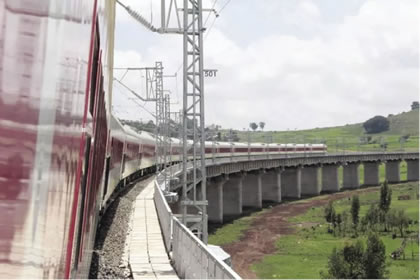
en.people.cn
The just-completed Addis-Djibouti Railway, constructed using Chinese design, equipment, and operations, is said to shrink the trip between Addis Ababa and Djibouti on the Red Sea from one week to ten hours. |
The condition of the Third World, of Africa, and of many Asian and Latin American countries is not natural! If the IMF and the World Bank had done for the last 50 years what these new Asian banks are doing now, you wouldn’t have poverty! You would have blooming gardens! There is no need to have such destruction as we are seeing in many parts of the world, except that it was the intention to keep these countries down, and to introduce this whole idiotic idea of limits to growth, resource exploitation, and all the rest.
So these new banks are there, and you can see, with Trump’s announcement that he will build a trillion-dollar infrastructure program, that the world could really grow together! The chairwoman of the Foreign Affairs Committee of the Chinese National People’s Congress, Mme. Fu Ying, was recently in New York, and gave a speech in which she said: The infrastructure program of Trump can be the bridge to the “One Belt, One Road.” And that is exactly what we in the Schiller Institute said in a study in 2014, which you can see at the book table: “The New Silk Road Becomes the World Land-Bridge.” We had one chapter which we added later on, on building U.S. infrastructure in connection with the rest of world development.
And at a recent intervention in New York, one of our colleagues intervened in a presentation with Henry Kissinger. And he asked, “Mr. Kissinger, what do you think about the LaRouche proposal and the Chinese proposal to have the United States join the One Belt, One Road?” You should know that the relations between my husband and Kissinger over the decades were not the most amiable, because he criticized many of Kissinger’s policies. So, it was quite amazing that he said: “Yes, the One Belt, One Road is very important for the world.” And Kissinger is meeting with Trump regularly now, and obviously you remember that Kissinger was the one who came to China in 1971 to prepare the visit of Nixon. It was just while I was in China that Kissinger came. And this was a big thing! Because up to that point, the Chinese outlook was that the United States was a paper tiger which can easily be defeated in the conflict with Vietnam and so forth. So to invite Kissinger and then Nixon was a real dramatic change in Chinese policy—so it is quite interesting that Kissinger would say this now.
LaRouche’s Four Laws
Now, obviously, infrastructure in the United States is not the only problem, because you need to stop the casino economy, the Wall Street excesses which have led to this crisis. But Trump in the election campaign promised repeatedly that he would introduce Glass-Steagall, the banking separation law of Franklin D. Roosevelt. Now we have to see if he will do it. There is now a lot of expectation; some of the progressive Democrats have said that they will collaborate with Trump on this point, but we have to see.
And again, we are not looking at him passively, but we are taking an active attitude, we are talking with Congressmen and with Senators, and we are bringing activists to meet with them from the different states. But the purpose is that we need the full package of solutions that have been proposed by Mr. LaRouche, who designed the four fundamental laws which are necessary to remedy this crisis. And the first of these laws is the implementation of Glass-Steagall. We have to do exactly what Roosevelt did in 1933: You separate the banks. The commercial banks will get protected. The investment banks must take care of themselves, without taxpayer money, without quantitative easing—and if they turn out to have red figures in their books, they have to close down. That’s simply what should happen, and we really don’t need them.
But that is only the first step. Then you go to national banking; this is not some socialist or communist idea, but it is what the first Treasury Secretary of the United States Alexander Hamilton did, who really united the United States by taking the debt from the War of Independence, by unifying the states’ debts and making them into a Federal debt, and then implemented taxation to stabilize the debt, and use that as a basis for new credits for investment.
Now, that model has been repeated. It was done by John Quincy Adams, who created the Second Bank of the United States, from 1816 to 1836; and this First and Second Bank of the United States were both used only for investment in the real economy. And it was implemented again in principle by Lincoln, who was advised by Henry C. Carey, and went to the Greenback system, to U.S. notes.
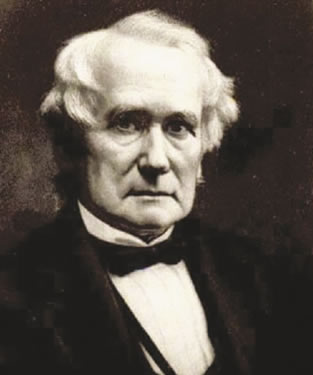
Henry C. Carey |
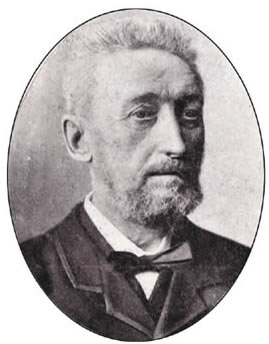
Wilhelm von Kardorff |
This system, by the way, in which Lincoln was advised by Henry C. Carey, was also the means through which Germany transformed itself in a few years, from a feudal country into an industrialized country at the time of Bismarck. This is very important: Because if you read all the biographies of Bismarck, you will not find one reference to Henry C. Carey. And you will not find a reference to Wilhelm von Kardorff. If anyone wants to study this period in more depth, I can only advise him to read a little booklet called “Against the Stream,” where Wilhelm von Kardorff, who was the head of the German industry association at the time of Bismarck, explained the physical-economic reasoning which was what persuaded Bismarck to abandon free trade, and go to a protectionist system like what Lincoln had done in the United States.
It was the same system which was implemented by Franklin D. Roosevelt as the Reconstruction Finance Corporation, which gave the credits for the New Deal, for all the infrastructure projects, the Tennessee Valley Authority project, the Rural Electrification, and the CCC program. They pulled youth into real education and jobs programs, and that was the way the United States was led by Roosevelt out of the Depression, and became the most industrialized, developed country by the end of the Second World War. And it was that same approach which the German Kreditanstalt für Wiederaufbau, the Credit Bank for Reconstruction, used to achieve the German Economic Miracle in the postwar period, because the KfW was based on the Reconstruction Finance Corporation of Roosevelt.
The purpose of this credit system is not just simple investment, but the purpose must be to increase the productivity of the production process through the injection of science and technology, and to go to higher forms of energy flux density associated with these higher technologies. It must also be capital-intensive.
But the fourth law of Mr. LaRouche is really almost the most important, because if you look at the effects of the globalization of the last five decades, since approximately the death of Kennedy, they have destroyed much of the productive capacity needed to maintain the existing world population of 7 billion people. This has been because of a lot of wrong economic principles, like cheap labor, “buy cheap, sell dear,” and “control the trade.” In the beginning phase even China was a cheap-labor country. The actual productive powers of the trans-Atlantic world have collapsed.
|
tech.sina.com.cn
The Experimental Advanced Superconducting Tokamak at China’s Institute of Plasma Physics, in Hefei. |
So this is why Africa is poor; this is why the Middle East is poor; why many other countries are still poor. So you need to have an injection of science and technology, to increase the productivity of the entire capacities worldwide, and the only efficient way, the necessary way must be a crash program for the development of thermonuclear fusion power and space technology.
Because these are the areas which you can say with absolute scientific certainty, will lead to the desired increase in productivity. Now the reason for fusion power is very obvious, because once you have thermonuclear fusion, you will have through the incredibly high heat associated with fusion (100 million degrees), a side technology which is called the fusion torch; and with that you can take all the waste and separate it into different isotopes, and create new raw materials.
So already with deuterium and tritium, which are the fuel for the first generation of fusion power, we will have energy security for all of mankind, and we will have raw materials security, and that is an extremely important goal to reach. But the main reason that we don’t have fusion power yet, is because—and we did a thorough investigation of this—if you look at the investment into fusion in Europe and in the United States, it was always below the threshold needed to make a breakthrough. It was just enough to keep the technology and research going, but if you don’t launch the crash program, you will never actually achieve it.
And China—what a surprise—is now the only country which is increasing its investment into fusion research. It made a major breakthrough just recently in the EAST program—Experimental Advanced Superconducting Tokamak—which is in the Institute for Plasma Physics in Hefei, where they were able to stabilize a hydrogen plasma for 100 seconds, and reach a temperature within the plasma of 50 million degrees, which is about half what is needed to keep the fusion process going on the basis of deuterium and tritium.
China has a very ambitious program. It wants to have the first test fusion reactor operating by 2025, producing 200 MW of electricity, and then move immediately to upgrade that into an operating reactor producing 1 GW. But China is already looking at the second generation of fusion power, while they are building the basis for the first generation—and that is immediately associated with the Chinese space program. Next year, in 2017, the Chang’e-5 mission will go to the Moon, where it will land a vehicle—a rover—on the Moon to take samples from the surface and bring them back to Earth.
The Extraterrestrial Imperative
And then, one year later, in 2018, the Chang’e-4 mission is supposed to land a space vehicle for the first time on the far side of the Moon. Now this is very, very exciting, because the far side of the Moon is not disturbed by the radiation coming from the Earth, and therefore on the one hand, you can use it to set up radio-telescopes which you could not use on the near side of the Moon; and this will allow you to have much, much deeper perspectives into the Solar System and the Galaxy and beyond; but you can also start looking at mining helium-3 from the far side of the Moon.
Helium-3 is an isotope of helium, and it is a perfect fuel for the second generation of thermonuclear fusion power, because it allows you to take electricity directly from the physical fusion process for the first time, and not to have to go through turbines or other heat-powered machines.
Now, there are only 15 tons of helium-3 on the Earth; but there are 1-5 million tons on the Moon. And for practically indefinite energy security on the Earth, we only need about 100 tons. So it’s important that people understand that we are on the verge of a completely new way of organizing affairs on the Earth; and this has everything to do with the long-term ability of mankind to survive as a species.
Mr. LaRouche has developed the correlation of energy-flux density with relative population density. In other words, there is a correlation between the energy density you use in the production process, and the number of people you can maintain. Which is why the idea of “decarbonization” of the world economy is really genocide: Because if you eliminate coal, gas, fossil fuels, nuclear energy, and go only to “alternative” energies, as some people are proposing these days, the population potential you can maintain with that is about 1 billion or less. And that should be very, very clear.
View full size 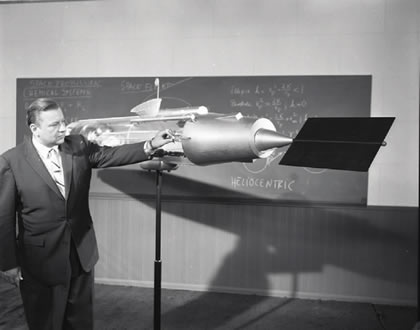
Krafft Ehricke |
The late German space researcher and rocket scientist Krafft Ehricke is very, very important, and we are planning to have two big conferences next year on the 100th anniversary of his birth: Because he had a vision of why man must go into space.
First of all, he had a very fascinating idea of the evolution of life on the planet. He had the idea that life developed out of the oceans, and then, through photosynthesis, on the land. Then higher species developed, where each species had what we would call nowadays, a higher energy-flux density in its metabolism, and eventually man appeared. And then, man first settled at the rivers and on ocean shores; and then man—because man is the one species which has the creative ability to come up with new technologies all the time—brought infrastructure inland, building roads, waterways, canals, then trains, and in that way started to conquer more and more of the landlocked areas of the continents.
And now, look in that light at the present program of the New Silk Road and our more advanced conception of “the New Silk Road must become the World Land-Bridge”; look at this World Land-Bridge report, or this World Land-Bridge idea, which is the conception that you will bring infrastructure development to all landlocked areas in all continents. So with that the infrastructure development of the planet is completed, at least in principle.
And then, the next level, the next stage of infrastructure development is the colonization of nearby space: going to the Moon, industrializing the Moon, and taking the Moon as the starting point for space travel to other heavenly bodies, like Mars and other planets.
So Krafft Ehricke developed something which he called the “the three fundamental laws of astronautics,” which I want to read to you, because I think they’re extremely important. The first law says:
“1. Nobody and nothing under the natural laws of this universe impose any limitations on man, except man himself”; which is a fundamental idea which used to be normal in European humanism. That man is infinitely perfectable and nothing blocks the perfection of man other than man himself. I think this is an idea which has been almost lost nowadays, because people have become adjusted to the fallacy that everything is limited, everything is known already, and we can’t even make fundamental breakthroughs any more—but not so.
And the second law, Krafft Ehricke developed is:
“2. Not only the Earth, but the entire solar system, and as much of the universe as he can reach under the laws of nature, are man’s rightful field of activity.” Now that is an equally beautiful idea, that the universe is our garden. It’s not just the Earth, but the entire Solar System and whatever else we can reach.
And then in the third law, he says:
“3. By expanding through the universe, man fulfills his destiny as an element of life, endowed with the power of reason and the wisdom of the moral law within himself.” That is a very beautiful idea also, that it’s our destiny to fill the universe, not only that we have to plant the Earth, as it’s said in the Bible, that man has to subdue the Earth and multiply; but that we have to extend ourselves in the universe, because we have the gift of the power of reason, and we have a moral law inside ourselves. That also has been forgotten, that people have an “inner voice,” something like a conscience, and that that conscience can be the guideline; many people have forgotten that such a thing exists.
Obviously the significance of this philosophical and also practical dimension of space, is that we as a human species are not Earth-bound, that we are capable of leaving the Earth, and you can already see the next platforms; Mr. LaRouche defined this notion as an economic platform, to specify that the most advanced technology at each level defines a platform. So we had the platform of hunters and gatherers; we had the platform of agriculture; we have the platform of the steam engine, the platform of, let’s say, air travel, and the first platform of space activity is the ability of man to even leave the surface of the Earth.
View full size 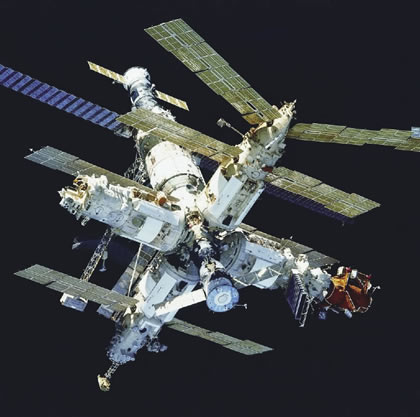
All China Women’s Federation
China expects to complete the construction of its space station, depicted here, by 2023. |
It may not be self-evident that man would get the idea you don’t have to stay on the Earth, but that you can develop spacecraft and get into an orbit! Which is about the platform we are now at with the International Space Station (ISS), and with the first Moon landings. And then the second platform will be space travel, where we use installations on the Moon, we industrialize the Moon, we create Moon villages, to then travel from one heavenly body to the next, like from the Moon to Mars.
And then the third level will be that we produce in space what we need, in other words, we don’t take food and fuel and other things up in a spacecraft, but that we take the resources existing in space to produce which will be necessary—if we have long-term space travel with spacecraft fueled by fusion energy, for example, which makes it much faster. But you can already see that that will be the next level.
Krafft Ehricke called this process of space travel, “the extraterrestrial imperative of man.” This is very beautiful because it implies that once man becomes a space-faring species, that you have to be rational. You cannot go to the Moon and have a fit; it’s not good for your health if you do that! So it requires that man become adult, and that man continuously develop new horizons. And I think that’s a very beautiful idea.
It is interesting that despite all the greenie ideology which has infested people’s minds in the last 40 years, that ESA, the European Space Agency, just had a conference with the ministers of the 22 participating countries, and in this context, it took a public opinion poll, and it turned out that 88% of all the people polled were in favor of space exploration: which means they’re culturally optimistic concerning the idea of space. And even more, 96% thought that space research gives mankind more opportunities than anything we can do on Earth. For instance, space medicine is the most advanced medicine, and things like that.
Dialog of Classical Cultures
This is very beautiful, because when you are talking about a new paradigm, we want everyone to think like astronauts, cosmonauts, and taikonauts, because all of them, when they come back from the ISS and speak at press conferences, they all say: When you look at Earth from space, you have a completely different perspective. You see one humanity sitting on a small, fragile, blue planet. You don’t see borders, you don’t see wars, but you see the one mankind—and that is the view which we have to induce people to have if the new paradigm is going to succeed. It is what Xi Jinping calls “a community of destiny for the future of mankind.” We are a community of destiny because in former times, civilizations could go under and others could rise at the same time, and neither would know about it. But because of nuclear weapons, the speed of air travel, the possibility of epidemics travelling around the world, and many other factors, we are so much sitting in one boat, that you cannot have one part of the world go under and another one prosper—but we have to really make the jump away from geopolitics to the idea that we are one humanity: And that has to start in the head.
I mean, there will be still legitimate room for nations, for languages, for culture, but you have to start in your mind with the one humanity, and there must never again be an interest of one nation or a group of nations, which is in violation of the interests of mankind as a whole. And either we make that jump or we will not exist. And I think with the “win-win” perspective of China, and the New Silk Road, we have a realistic possibility of making exactly that jump.
Now we also have to re-establish international law, which has been completely trampled upon by the neocons, which essentially is what’s in the UN Charter, which means a total respect for the sovereignty of countries, noninterference in their internal affairs; respect for their different social models; all of this “democracy” and “human rights” was only a pretext anyway, and it should be put in the garbage can. Because you don’t have democracy; if Wall Street can buy a Senator for $5 billion you don’t have democracy. And I could say a lot about European parties as well.

Nicholas of Cusa, 1401-1461 |
So, we have to have a new paradigm, and this new paradigm was already envisaged by Nicholas of Cusa in the 15th century, when he said, the only reason that different cultures can communicate with each other is because all of them produce wise people, artists, musicians, and scientists who all speak a universal language. You can have musicians from all nations play in one orchestra, totally understanding each other, because music is a universal language. A scientist who makes a discovery in one country can replicate that discovery in another country, because it’s a universal language.
So we have to have a communication on that level, of scientists, of artists, and then there will be no problem among the cultures, and we will have what Nicholas of Cusa also envisioned: a harmony in the universe, because all microcosms develop into a harmonious macrocosm. And that is also the idea of Confucius, who had exactly that same idea of a harmonious development: If all develop their potentialities you will have harmony in the large, and it will also mean the fulfillment of Leibniz’s vision that China and Europe reach out and grasp each other’s hands, and develop the rest of the world between them and beyond them; and this development will not just be static development, but like a contrapuntal fugue, where the development of each reaches into the other and leads to a beautiful totality.
Now, practically, that means we have to have a Marshall Plan Silk Road program for the reconstruction of the Middle East; now that there is hope for the war to come to an end in Syria, we must bring the reconstruction of all of these countries onto the table. Xi Jinping already said, the Silk Road can be extended into the Middle East. General Flynn, already in 2015, talked about a Marshall Plan for the Middle East. The Chinese don’t so much like the term “Marshall Plan” because it has a Cold War connotation, so let’s just call it a “New Silk Road Marshall Plan without Cold War connotation”—or whatever. [laughter]
Then, naturally, we also need the participation in that from all the neighboring countries: Russia, China, India, Iran, Italy, France, Germany, Denmark, and the United States, should all work together to rebuild this region! We let it happen when this incredible destruction occurred. I mean, if we didn’t cause it, we didn’t do anything to stop it, so we have a moral obligation to rebuild this area. And the same goes for the development of Africa.
Xi Jinping already said at the G20 meeting that China will be instrumental in helping to industrialize Africa. And we held a meeting of African representatives in Hamburg, just two weeks ago, where the mood had completely shifted: Different African speakers said: Yes! There is a new paradigm shaping the world. China, India, and Japan are coming to Africa and investing in real things, in bridges and railways—and the Europeans will be sidelined, because they only come with speeches, Sunday sermons, democracy demands, and obligations to pay debt—but they will be left behind if they don’t change.
They should come and participate, you know; but it needs our intervention to accomplish exactly that.
So these changes are the key challenge for the next couple of months, because Trump has promised he would get these changes under way in the first hundred days of his Presidency. And we all have to participate in building a completely new set of relations among nations. We have to overcome geopolitics, and build exactly this common community for the future of mankind. We have to realize this program, the New Silk Road must become the World Land-Bridge. And I only want to add one thing, which is very, very important: That together with this economic development, we must have a new Renaissance of Classical culture; because with globalization you not only had all of these things I described, but you also had a terrible cultural degeneracy. And if you look at the youth culture of today in particular, it is ugly, it is sometimes even Satanic, and you don’t need to go to black gothic, you can stay with Madonna to come to the Satanic, and that is obviously the complete destruction of creativity. Note also the fact that Trump has now appointed several people who are known to be hardliners against drugs, like for example, Senator Jeff Sessions, who will be the Attorney General, and others. You know that the drug epidemic is one of the causes for the suicide rate in the United States, and the fact that during the time NATO was in Afghanistan, the drug production there increased forty-fold! Obviously, it was with the permission of the NATO people who were there, because otherwise it wouldn’t have happened. This is regarded by Russia, for example, as one of the largest threats to its national security, because 100,000 people per year are affected and many of them die. And therefore, this drug epidemic must be overcome.
But we have to have a beautiful culture and revive the Classical traditions of each nation, and we have heard from Feride Istogu Gillesberg one very beautiful example. I’m absolutely certain that when people come to know the beautiful examples of the other cultures, they will fall in love, and all xenophobia will vanish, and all hatred against foreigners will disappear. Because when they see the best expressions of the culture, of the high point of the other culture, they will realize that the universe is all the more beautiful because there are so many cultures and so many nations. And the world would be much poorer and much more boring if there were only one unipolar culture!
So we should add to this perspective the idea of a dialogue of cultures on the highest level.
And I think we should be very happy, because if this all goes in the right direction, which it is in large part, our subjective obligation to help—and I’m asking all of you to not be passive observers, but to join with the Schiller Institute to help to implement these visions and these ideas—because then, we will be very lucky that we in our lifetime, can live the new paradigm. And the new paradigm will be the first time that man’s dignity will be realized—and I think that is a very, very important mission we should all adopt. [applause]

